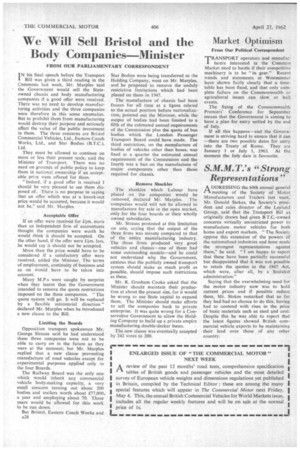We Will Sell Bristol and the Body Companies—Minister
Page 30

If you've noticed an error in this article please click here to report it so we can fix it.
FROM OUR PARLIAMENTARY CORRESPONDENT IN his final speech before the Transport Bill was given a third reading in the Commons last week, Mr. Marples said the Government would sell the Stateowned chassis and body manufacturing companies if a good offer were received. There was no need to develop manufacturing activities and the three companies were therefore in this sense anomalies. But to prohibit them from manufacturing would destroy their purpose and seriously affect the value of the public investment in them. The three concerns are Bristol Commercial Vehicles, Ltd., Eastern Coach Works, Ltd., and Star Bodies (B.T.C.), Ltd.
They must be allowed to continue on more or less their present scale, said the Minister of Transport. There was no need on grounds of public policy to keep them in national ownership if an acceptable prke were offered for them.
"Indeed, if a good offer is received I should be very pleased to see them disposed of. There is no purpose in saying that an offer which was at a knock-out price would be accepted, because it would not be," said Mr. Marples.
• Acceptable Offer If an offer were received for Ifm. more than an independent firm of accountants thought the companies were worth he would think it should be accepted. On the other hand, if the offer were Lim. less, he would say it should not be accepted.
More than the price would have to be considered if a satisfactory offer were received, added the Minister. The terms of employment, continuity of business and so on would have to be taken into account.
Many M.P.s were caught by surprise when they learnt that the Government intended to remove the quota restrictions imposed on the three companies. "The quota system will go. It will be replaced by a flexible ministerial direction" declared Mr. Marples when he introduced a new clause to the Bill.
Limiting the Boards Opposition transport spokesman Mr. George Strauss said he had understood these three companies were not to be able to carry on in the future as they were at the moment; but Mr. Marples replied that a new clause preventing manufacture of road vehicles except for experimental purposes applied only to the four Boards.
The Railway Board was the only one which would inherit any commercial vehicle body-making capacity, a very small concern turning out about 200 bodies and trailers worth about £77,000. a year and employing about 70. Three years would be allowed for this work to be run down.
But Bristol, Eastern Coach Works and A28 Star Bodies were being transferred to the Holding Company, went on Mr. Marples, and he proposed to remove the unduly restrictive limitations which had been placed on them in 1947.
The manufacture of chassis had been frozen for all time at a figure related to the actual position before nationalization, pointed out the Minister, while the output of bodies had been limited to a fifth of the estimated annual requirements of the Commission plus the quota of bus bodies which the London Passenger Transport Board could have made. The third restriction, on the manufacture of bodies of vehicles other than buses, was fixed at a quarter the estimated annual requirement of the Commission and the fourth was a ban on the manufacture of major components other than those required for chassis.
Remove Shackles The shackles which Labour have placed on the companies would be removed, declared Mr. Marples. The companies would still not be allowed to manufacture for sale in the open market, only for the four boards or their wholly owned subsidiaries.
Mr. Strauss protested at this limitation on sale, saying that the output of the three firms was minute compared to that of the entire manufacturing industry. The three firms produced very good vehicles and chassis—one of them had some outstanding models—and he could not understand why the Government, anxious that the publicly owned transport system should make as much profit as possible, should impose such restrictions as these.
Mr. R. Gresham Cooke asked that the Minister should maintain their production at about the present size, for it would be wrong to use State capital to expand them. The Minister should make efforts to sell the companies back to private enterprise. It was quite wrong for a Conservative Government to allow the Holding Company to build up a private empire manufacturing double-decker buses.
The new clause was eventually accepted by 242 votes to 200.




















































































































